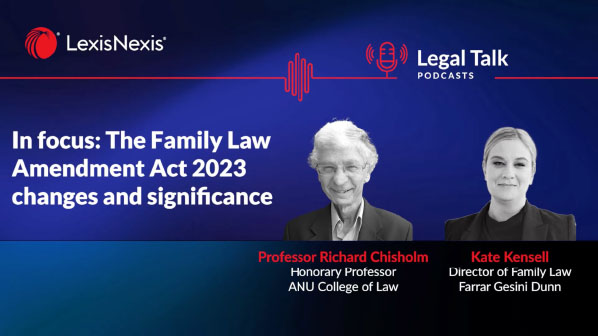The use of artificial intelligence in legal practice continues to mature. While early adoption focused on discrete applications such as drafting assistance, document summarisation, and research support...
Introduction Artificial intelligence is reshaping the ways organisations manage the entire employment lifecycle, from screening resumes and identifying potential candidates to supporting employee development...
Authored by Jennifer Raphael , Senior Legal Writer, Construction. 2026 is shaping up to be a pivotal year for construction law in Australia. Across multiple jurisdictions, governments are moving from...
Across Australia and New Zealand, legal professionals are embracing a new era of AI-powered transformation. At the 2025 LexisNexis Legal AI Showcase , hundreds of attendees tuned in to see how Lexis...
Authored by Seeta Bodke , Head of Product - Pacific, LexisNexis® Legal & Professional At LexisNexis, our mission is to advance the rule of law through responsible innovation. The launch of Protégé General...

Authored by: Jocelyn Magee, Legal Writer, Practical Guidance Family.
June 2025 heralds the beginning of a transformative era in family law, marked by significant legislative amendments aimed at modernising and enhancing the legal framework. These changes are designed to streamline legal processes, bolster protections for vulnerable parties, and address contemporary issues within family law. This blog delves into the detailed amendments and offers strategic takeaways for family lawyers to adeptly navigate the evolving legal landscape.
In-Depth Amendments to the Family Law Act 1975 (Cth)
The Family Law Amendment Act 2024 (Cth)(FLAA) introduces a range of critical changes to the Family Law Act 1975 (Cth) (FLA), effective from 10 June 2025. Key amendments include:
- Addressing Economic and Financial Abuse: The new, enhanced definition of economic or financial abuse in section 4AB of the FLA underscores the importance of recognising and addressing non-physical forms of domestic violence.
- Abolition of Mandatory Counselling for Short Marriages: The removal of the requirement for couples married for less than two years to attend counselling before filing for divorce simplifies the divorce process, reducing delays and emotional strain for these couples.
- Attending divorce proceedings: The FLAA amends s 98A of the FLA, so that divorcing parties who file their divorce application jointly or solely, or who have or who don’t have children, will all have the same court attendance requirements, again simplifying the divorce process.
- Changes to the s 75(2) considerations in respect of the grounds for spousal maintenance: These amendments introduce considerations of family violence in the list of factors that the court can consider when assessing what order may be proper for spousal maintenance. The court will also be able to consider the need to provide appropriate housing for a child.
- Simplifying property settlements: The significant changes to both de facto and married property settlements are designed to clarify and simplify the property settlement process and more accurately define considerations that the court must consider when dividing property. The changes to property settlements include:
- Clarifying that the court is not required to make an order adjusting property interests, and will only do so if satisfied that it would be just and equitable to make such an order;
- Setting out the steps for how a property settlement must be approached. These steps are:
- Identifying each party’s legal and equitable rights and interests in any property;
- Identifying the existing liabilities of the parties;
- Considering the parties’ contributions; and
- Consider the parties’ current and future circumstances;
- Including the effect of any family violence, to which one party to the marriage has subjected or exposed the other party, on the ability of a party to the marriage to make contributions;
- Repealing the need to consider the factors in s 75(2) or s 90SF(3) of the FLA when dividing property and instead introducing a new list of “current and future circumstances” which include consideration of new factors, including family violence, wastage, liabilities and the need of either party to provide appropriate housing for such a child; and
- Recognising companion animals in property settlements - the FLA will allow for specific orders regarding the ownership of companion animals, acknowledging their emotional significance and role within family dynamics. This change requires lawyers to consider pets as part of property settlements, potentially affecting negotiations and outcomes.
- Extending the less adversarial approach in child-related proceedings to non-child-related proceedings: The repeal of Division 12A of Part VII and the enactment of a new Part XI, Division 4 will continue the less adversarial approach in conducting child-related proceedings, and will also now permit the same less adversarial approach to be taken in matters which include both child and non- child related proceedings, as well as matters which are completely non-child-related. For non-child-related proceedings, the parties will be required either to consent to the less adversarial approach or the court will make a direction that Part XI, Division 4 will apply. These less adversarial principles prioritise child safety, efficient case management, and the reduction of legal formalities.
- Duty of disclosure in property and financial matters: New sections will be introduced into the FLA, which set out the duty of disclosure in property matters. This duty is currently only set out in the Federal Circuit and Family Court of Australia (Family Law) Rules 2021 (Cth). The new duty will also establish an obligation on legal practitioners and family dispute resolution practitioners to make parties aware of their duty of disclosure and to encourage compliance by informing them about possible consequences of non‑compliance with the duty.
- Changes to arbitration: The FLAA removes the distinction between the types of matters that can be arbitrated privately or by court order.
- Children’s Contact Services: The government will be permitted to establish rules of accreditation in the Family Law Regulations relating to children’s contact services.
- Changes to the exemptions to attending a dispute resolution prior to commencing Part VII proceedings: An additional exemption will be included in s 60I(9), which is where there are reasonable grounds to believe that a person who has allegedly contravened an order made in the last 12 months has behaved in a way that shows a serious disregard for their obligations under that order. The FLAA also gives courts the express power to reject a Part VII application for filing if there is no certificate or applicable exemption.
- Protection of sensitive information: the court will be able to prevent access to evidence of certain confidential communications (‘protected confidences’) relating to communications occurring where a person seeks treatment or support from:
- health services (where ’health’ refers to both psychological and physical health);
- specialist family violence services; and
- specialist sexual violence services.
- Costs: s 117 will be repealed and a new Part XIVC will be introduced into the FLA, which clarifies the making of costs orders in family law matters, including when parties could be ordered to pay the costs of an independent children’s lawyer.
Strategic Takeaways for Family Lawyers
- Continuous Education and Adaptation: Regularly review updates from the Federal Circuit and Family Court of Australia, particularly regarding new court forms and practice directions resulting from these amendments. Staying informed is crucial for effective client representation.
- Master New Definitions and Concepts: Familiarise yourself with the definitions of economic and financial abuse, the new approach to property settlements and to costs, as well as to the duty of disclosure to provide comprehensive advice and advocacy for clients.
- Prioritise Child Safety and Efficient Case Management: Consider whether the principles for child and non-child-related proceedings are appropriate in any non-Part VII proceeding and will allow your case to progress efficiently, minimise delay and legal technicalities.
- Advocate for Vulnerable Parties: With the recognition of economic and financial abuse, lawyers must be proactive in identifying and addressing such issues, advocating for protective measures and fair settlements for affected clients.
The 2025 amendments to family law present both challenges and opportunities for legal practitioners. By understanding these changes and adapting practices accordingly, family lawyers can provide informed and effective representation to their clients in this dynamic legal environment. Embracing these amendments will not only enhance legal practice but also contribute to a more equitable and responsive family law system.

Check out our infographic on the new companion animal laws unleashed with Australia’s Family Law reforms.
VIEW INFOGRAPHICWatch the 20-minute Podcast on parenting reforms to Australia’s Family Law Act, which came into effect on 6 May 2024.
WATCH NOW
Learn more from the LexisNexis® Practical Guidance Family Law module here.




